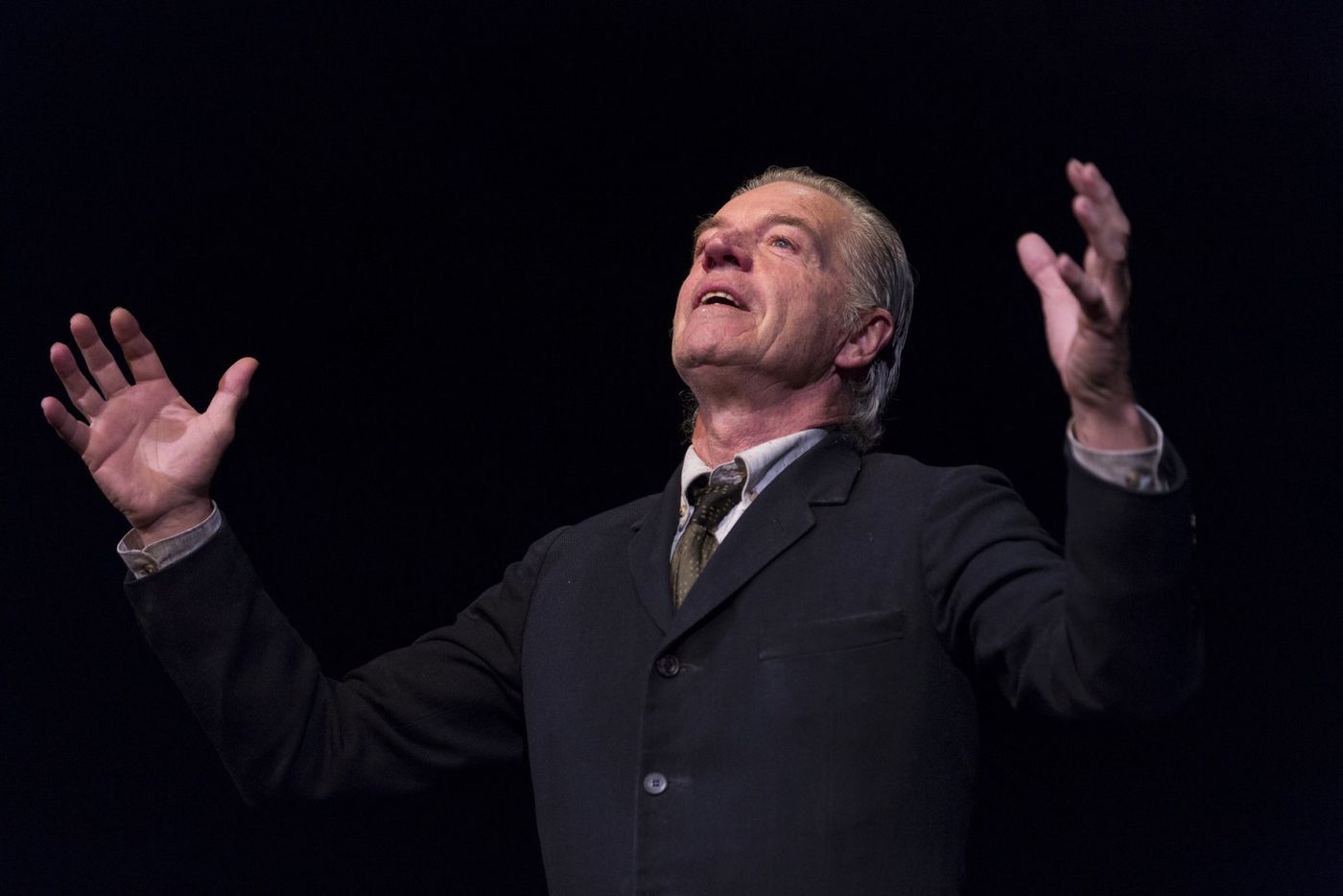Review: FAITH HEALER at Space Theatre, Adelaide Festival Centre
 Reviewed by Barry Lenny, Thursday 27th September 2018.
Reviewed by Barry Lenny, Thursday 27th September 2018.
The late Irish writer, Brian Friel's, 1979 play, Faith Healer, is a Belvoir production, presented by the State Theatre Company of South Australia, under the subtle direction of Judy Davis.
The Fantastic Francis Hardy travels all over Ireland, Scotland, and Wales with his wife, Grace, and his manager, ex-vaudevillian, Teddy, in tow. He claims to be a faith healer, with a string of supposed successes behind him, but he could just be a con artist. He does claim to have had successes, in particular, he speaks of a town in Wales where he healed all ten people who attended.
The play is made up of four lengthy and wordy monologues, opening with Frank, then Grace, then Teddy, and closing with Frank again. Colin Friels plays Frank, with Alison Whyte as Grace, and Paul Blackwell as Teddy. It breaks with tradition, relying on the script, the words, at the expense of movement. It was initially criticised for being static. A few people here and there left at the interval, presumably because of the duration of the monologues and the effort of concentrating.
I have no idea why, but Australian actors seem to have enormous difficulty with British regional accents. In this play, two of the characters are Irish, and the third is a Cockney. Whyte's somewhat variable accent slips from time to time, but Friels gives us a verbal "Cook's Tour" of Ireland, even including Belfast, which is rather surprising, as he has been playing the role since 2016. Paul Blackwell, however, gives us a consistent accent, and a considerably more animated and captivating performance, finding the humour in the monologue, that hides far more, ending in deep pathos. Why an accent coach wasn't employed, is a mystery.
Ballybeg, incidentally, is a town that appears in several of Friel's works, such as Dancing at Lughnasa, Philadelphia Here, and Translations, and it becomes an important location in this play. Ballybeg is the Anglicised version of Baile Beag, which simply means Little Town (Baile - Town, Beag - Little). Although there are numerous towns throughout Ireland bearing this name, Friel's is a fictional town in County Donegal, in the Province of Ulster, in the far north-west of the country. Kinlochbervie, Sutherland, Scotland, is another very important place, as you will discover in the darkest moments.
The play opens with Frank reciting the names of Welsh towns, dying towns, that he has visited in his long career.
"Aberarder, Aberayron Llangranog, Llangurig, Abergorlech, Abergynolwyn, Llandefeilog, Llanerchymedd, Aberhosan, Aberporth..."
This device is used at times through the play, marking the passage of time, an element with which Friel plays so that chronological order is impossible to follow.
We discover him standing on a bare wooden floor with a few chairs set out for his audience, and a much-used banner proclaiming his talents. It is one of a myriad of church halls in which he has plied his trade, the cheapest places that could be found, to make as much as possible. He recounts the good times and the bad, the successes and the failures. He refers to Grace as his mistress, and tells how he introduced her under a string of names.
The work of set designer, Brian Thomson, costume designer, Tess Schofield, lighting designer, Verity Hampson, and the composer and sound designer, Paul Charlier, are all vital to the production, integrated fully into the performance.
Accents aside, Friels is a commanding presence as Frank, bringing out the charismatic character but exposing his personal weaknesses and doubts. His Frank charms us, so that his horrible treatment of Grace and Teddy creeps up on the audience. Friels gives us a very complex and believable character, but hardly a loveable one. We wonder why the others stay with him.
When he imitates Teddy, he channels Michael Caine, in his broadly painted character days of Alfie and The Italian Job, that is, rather than in his later career, with films such as Harry Brown. He bringing added laughter to the role with this impersonation.
Whyte is disturbing as Grace, a woman totally captivated by a mentally abusive husband. The more positive she tries to be and the happier she tries to make her memories, the sadder it becomes. She regularly visits the bottle of Jamesons. The cracks appear in Frank's opening story, and widen as she talks, presenting a different and conflicting viewpoint. Whyte gives us a broken woman who has given up everything for Frank.
Blackwell takes over after the interval, bright and cheerful, constantly opening and drinking bottles of beer, perhaps to dull the painful memories, perhaps to help him overcome the emptiness now that it is all over, and reminiscing about his time with Frank and Grace, and about his life before that, managing vaudeville acts, including a single-minded, bagpipe-playing whippet. Beneath the faded banner, rescued from the trash, he draws humorous parallels between his two clients. His perspective offers another, very different version of the events, tinged with sadness and the suggestion of barely concealed depression. Blackwell is marvellous in the role.
Even at the end of Friels's second monologue, there are still many questions left to answer, and much uncertainty remains, sending the audience members away for each to come to their own conclusions.
In this memory play, Brian Friel explores, in poetic language, how memories are coloured by the feelings, conceptions, and attitudes of the three people. As Anaïs Nin said, "We don't see things as they are, we see them as we are."
Reader Reviews

Videos

